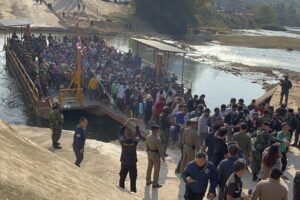Sri Lankans Trapped in Myanmar’s Scam Hell: The Dark Truth of Slave Camps
More than 250 people from 20 different countries, including a Sri Lankan, were rescued from cyber scam centres in Myanmar’s Karen State and brought to Thailand. These scam operations have become a major crime industry, targeting foreigners and forcing them into online fraud.

The Growing Cybercrime Industry in Myanmar
Myanmar has gained a notorious reputation as a hub for cybercrime, especially in areas like Myawaddy and Karen State. Criminal networks operate scam centres where people are lured with promises of high-paying jobs, only to be forced into illegal activities such as online scams, cryptocurrency fraud, and money laundering. Many of these workers are held against their will, suffering abuse and even torture.
Recent reports reveal that more than 56 Sri Lankans are still trapped in such compounds, unable to escape unless ransoms are paid. These centres are controlled by powerful ethnic armed groups like the Democratic Karen Benevolent Army (DKBA) and the Karen National Army, who profit from protecting these illegal operations.
How Sri Lankans End Up in Scam Camps
Human traffickers recruit workers by advertising fake jobs in Thailand, Malaysia, and other countries. Many Sri Lankans looking for better opportunities fall into these traps, believing they will be working in customer service or IT-related fields. Instead, they find themselves locked inside heavily guarded compounds in Myanmar, where they are forced to scam victims worldwide.
Scammers prefer workers who can speak English and Chinese, as these languages are used to target victims in romance scams, investment fraud, and fake job offers. Those who refuse to cooperate face physical punishment, and some have even been tortured or killed.
Thailand and China Crack Down on Scammers
Thai Prime Minister Paetongtarn Shinawatra recently met with Chinese President Xi Jinping and vowed to crack down on scam operations along the Thai-Myanmar border. Thailand has already taken steps by cutting power and fuel supplies to scam hubs and tightening banking and visa regulations to stop the movement of money and workers.
However, eliminating these criminal networks is not easy. Myanmar’s government has little control over Karen State, where these scam centres operate under the protection of armed militias. Although the DKBA recently handed over 260 foreign workers to Thai authorities, there are thousands more still trapped in these cybercrime syndicates.
Escaping the Nightmare
For those trapped, escape is nearly impossible without outside help. Families of victims are often asked to pay large ransoms to secure their release. Some manage to flee with the help of rescue groups, while others are only freed when international pressure forces local authorities to act.
The Sri Lankan government, along with international organizations like the International Organization for Migration (IOM), has been working to repatriate Sri Lankan victims. In September 2024, 20 Sri Lankans were rescued and returned home, but many more remain stranded in Myanmar’s cybercrime underworld.
The Reality of Myanmar’s Scam Cities
One of the most infamous scam cities is Shwe Kokko, a development project linked to Chinese investors and controlled by the Karen warlord Saw Chit Thu. Despite claims that scam activities have stopped, investigations show that illegal businesses continue to operate.
The scam industry in Myanmar is deeply connected to organized crime, corruption, and the country’s political instability. Many ethnic armed groups, while claiming to fight for independence, are heavily involved in these scams, making it difficult to shut them down completely.
What Can Be Done?
The Sri Lankan government must take stronger action to protect its citizens from falling into these traps. Awareness campaigns about online job scams, stricter travel regulations, and increased cooperation with Thai and international law enforcement are crucial to stopping human trafficking.
For those still trapped in Myanmar, international pressure and diplomatic efforts remain their only hope for freedom. Until stronger action is taken, more Sri Lankans may find themselves caught in the web of Myanmar’s cybercrime empire, facing a nightmare with no escape.







